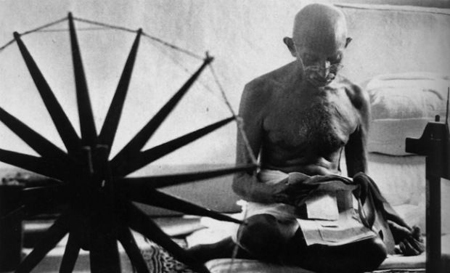
London, Nov 6: Mahatma Gandhi's over eight-decade old 'charkha', one of his most prized possessions that he used in Yerwada Jail during the 'Quit India Movement', was today auctioned in the UK for a whopping 110,000 pounds, nearly double the expected price.
Gandhi's last will also sold for 20,000 pounds at the specialist sale of historical documents and artefacts by the Mullock's Auction house in Shropshire.
"Gandhi's charkha (spinning wheel) was sold for 110,000 pounds at the auction while his last will fetched 20,000 pounds," Michael Morris, a Mullock's official, told PTI. The auction house refused to name the buyer.
Made of Indian teak, the charkha with a minimum bid of 60,000 pounds, was used by Gandhi while he was in the prison in Pune and was later gifted by him to American Free Methodist missionary Revd Floyd A Puffer in 1935.
The American was a pioneer in Indian educational and industrial cooperatives. He invented a bamboo plow that was later adopted by Gandhi.
Puffer and his wife worked as missionaries in India and in 1935 displayed Gandhi's spinning wheel at a number of talks and events.
Later, Puffer presented the charkha to fellow missionary Reverend Dr Frank J Kline in 1965. It has since passed through Kline's family to the present owner by descent.
One of the earliest known references to the charkha is an article in the December 1931 issue of the monthly Popular Science.
Gandhi's will was written in Gujarati at the Sabarmati Ashram and it supersedes the will dated 1921 that was sold at an earlier auction by Mullock's.
The later will provides a historic insight into Gandhi's thinking and his speculation for the future.
Mullock's has put under the hammer over 60 of Gandhi's most prized possessions, including the charkha, important documents, photographs and books.
The auction house's specialist Richard Westwood Brookes said: "The charkha is one of Gandhi's most prized possessions as he devised the workings of it himself. The charkha was used by him in Yerwada Jail whilst fighting for the rights and independence of India. It has impeccable provenance and is unquestionably the most important Gandhi artefact we have ever had for sale.
"The charkha was the physical embodiment and symbol of Mahatma Gandhi, he once said: 'In my dream, in my sleep, while eating, I think of the spinning wheel. The spinning wheel is my sword. To me it is the symbol of India's liberty," Brookes said highlighting the importance of the sale.
"The origins and operation of the Yerwada portable charkha are described in the American monthly Popular Science (December 1931): 'Mahatma Gandhi ... has devised a portable spinning wheel that folds into a bundle about the size of a portable typewriter and has a handle for carrying," Mullock's website said in its description of the sale item.
"When unfolded for use it is operated by turning a small crank which runs the two wheels and spindle of the device. Gandhi worked out the details of this machine it is reported while he was confined to the Yerwada jail in India. He often mentioned that his daily spinning was a form of meditation," it said.
Gandhi spent several years in Yerwada Jail during India's freedom struggle notably in 1932 and later in 1942 during the Quit India movement along with many other freedom fighters.





Comments
Hello, i think that i saw you visited my weblog thus i came to “return the favor”.I am trying to find things to enhance my site!I suppose its ok to use some
of your ideas!!
Visit my blog: Elizabeth: http://beanboss.moonfruit.com/
Add new comment